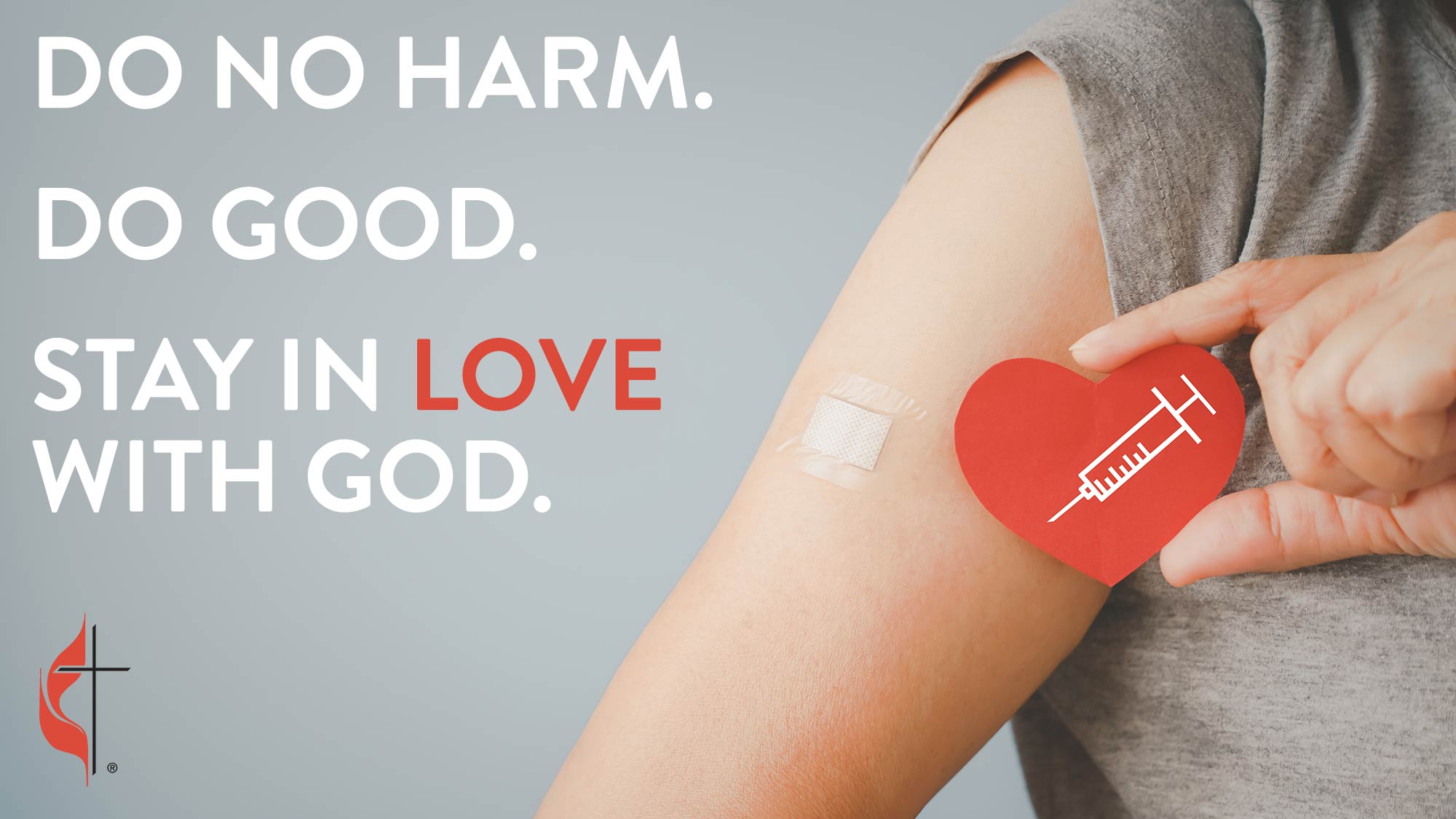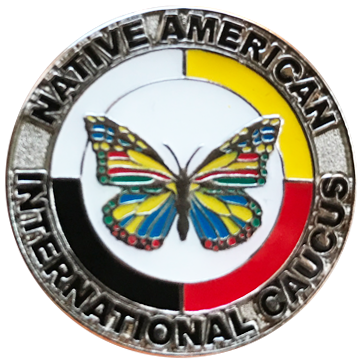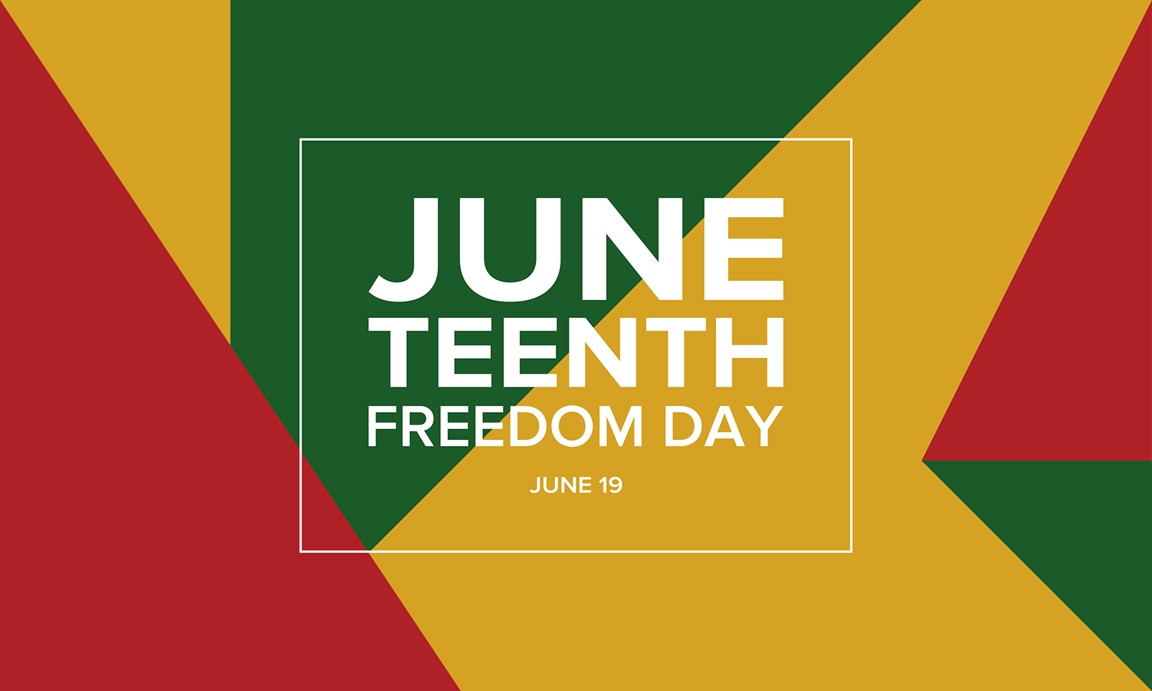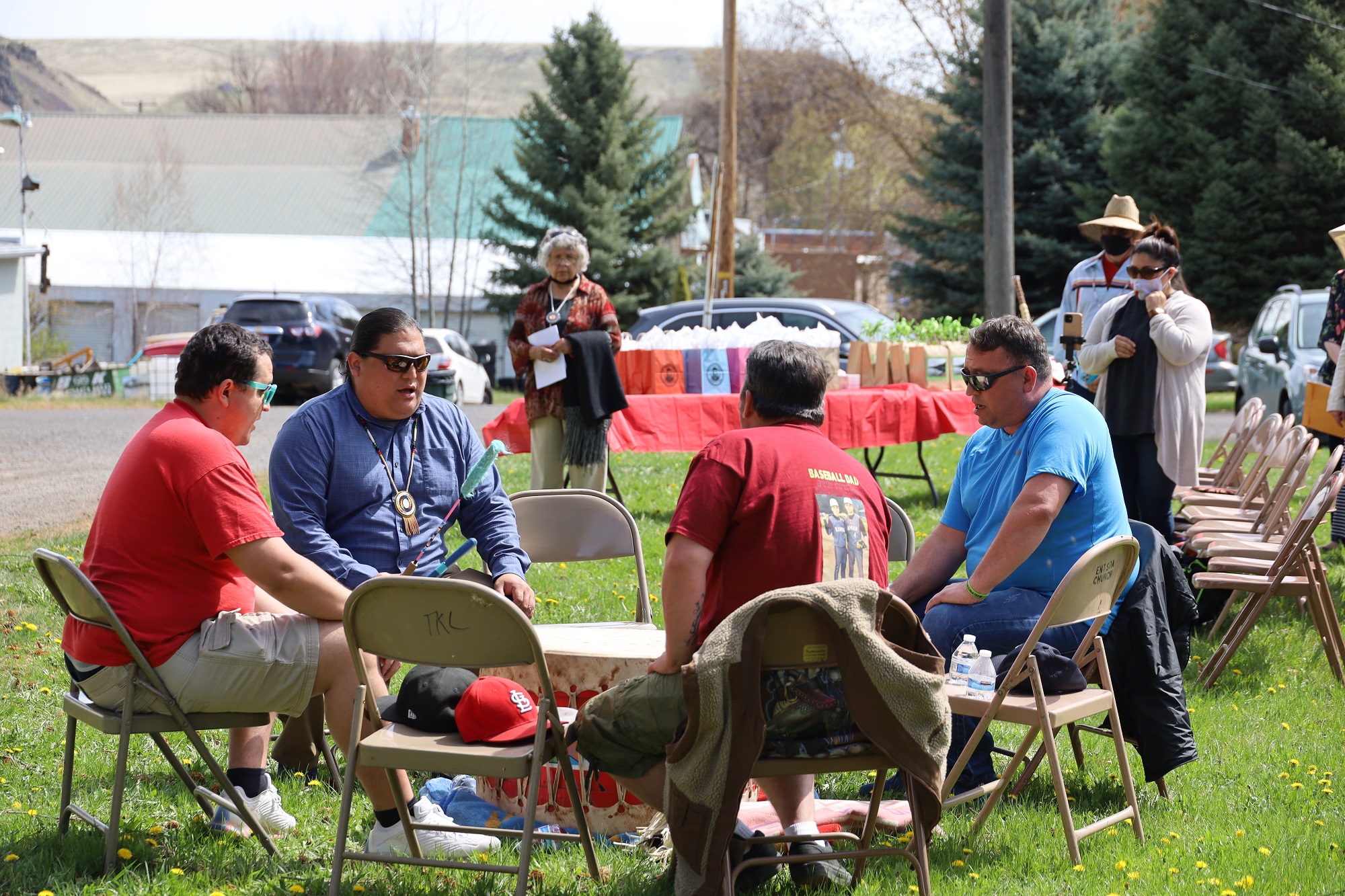BSA Extension Letter | Oct. 6, 2021
Grace and Peace to you,
In late August, you received a letter from Bishop Elaine Stanovsky regarding the ongoing Boy Scouts of America bankruptcy, with some guidance originating in our denomination’s legal advisors. This group of chancellors, advised by bankruptcy experts and in consultation with church leaders, is engaged in this very complex matter to ensure that any of our churches who act as chartering organizations, are protected to the fullest extent possible as we wrestle with the shadow of abuse in our midst over many decades.
Previously, the guidance was to pause the chartering/re-chartering of scouting troops with a reset on December 31, 2021. We have now received updated guidance to extend this pause until March 31,2022. With this additional time, the BSA and legal representatives of the UMC will continue work on a new chartering arrangement that protects both organizations appropriately. This means that whatever status (charter or facility use agreement) that your church now has with your troop, old or newly negotiated, can remain in force until the end of March 2022.
There will be a joint statement released this week that will outline this extension for the bankruptcy case to run its course and to give time for development of a new agreed-upon form of agreement for United Methodist organizations wishing to charter a Scout unit in the future.
The two organizations agree that whatever agreements are currently in place can be extended until March 31, 2022, after which a new charter agreement should be available to take the relationship into the future.
Today we ask that you extend your current relationship with BSA troops, at whatever CURRENT status it is, until March 31, 2022, and pray for the survivors’ healing. God has gifted us with compassion and wisdom to reach just settlements and faithfully steward the resources of the UMC.
Please don’t hesitate to reach out to one of us if you have any questions.
In Christ,
Brant and Dan
 |  |
| Treasurer Alaska & PNW Conferences bhenshaw@pnwumc.org | Treasurer/Benefits Officer Oregon-Idaho Conference dan@umoi.org |
From the Bishop, RE: Boy Scout units chartered by local United Methodist Churches
A call to truth-telling and repentance from The Native American Caucus of The United Methodist Church
As United Methodists begin to understand the historical role the church has played in generations of colonization and harm to Native American peoples, a petition has emerged, calling on churches to tell the truth and repent for their historical role in the loss of countless lives and devastation of rich indigenous cultures.
Greater Northwest Area Bishop Elaine JW Stanovsky has signed the petition, as has Rev. Dr. Allen Buck, director of the GNW Circle of Indigenous Ministries and other leaders in the GNW Episcopal Area.
“Join with us in calling for deeply transparent exploration and truth-telling about our role and complicity in taking land, culture, resources and children from the First Peoples here and around the globe,” said Buck, a citizen of the Cherokee Nation who also pastors Great Spirit UMC in Portland. “The Church has helped build and maintain systems which prioritize and benefit ‘whiteness’ – contributing to trauma that impacts generations of Indigenous people.”
At the heart of the petition is the fact that the remains of thousands of Native American children are located in mass burial sites at boarding schools across North America. Most of those boarding schools were operated by churches – including predecessors of The United Methodist Church – and served as places of abuse and terror for generations of Native American children.
History has revealed that these boarding schools were used to abuse hundreds of thousands of Native American children who were removed – often violently – from their homes and families and placed in these schools in the years between 1869 and the 1960s. There were 367 government-funded Native American Indian Board Schools, according to the National Native American Boarding School Healing Coalition and many of those schools were run by churches.
Children at these schools were regularly beaten, had their hair forcefully cut and their sacred traditions, languages and identities stolen or destroyed. They were abused physically, emotionally and sexually and were abused or mutilated for speaking their native languages.
This petition calls for churches to commit to discovering the locations and records of Methodist run boarding schools and search the physical properties for mass graves “by whatever means necessary” and to listen to and collect the stories from family members whose ancestors were impacted by a Methodist boarding school.
The petition also calls on The United Methodist Church to set aside October 6 as a day of remembrance as part of The Boarding School Healing Project. On Oct. 6, 1879, Gen. Richard Pratt took children from the First Nations and opened the boarding school in Carlisle, Penn. Because of this date and recent gravesite discoveries, the petitioners ask The UMC to observe Oct. 6, 2021 as a “Day of Truth and Repentance for Our Children.”
Stanovsky urges United Methodists and others in the GNW Area to sign the petition as an act of repentance and a commitment to continuing the long work of addressing the historical harms the church has caused for generations of Native Americans.
“This is just the first step in many acts of repentance we must commit to listen to the voices of Native American neighbors, to acknowledge the sins embedded in the teachings and actions of Christian churches and to repent of these sins as a Church, and followers of Christ, to begin addressing the generational atrocities the church has committed,” she said. “There is much, much more work to be done. It is about becoming trustworthy in our relationships with people whose trust has been deeply betrayed time and time again. It goes far beyond putting names to a statement. It requires deep soul searching to understand what went wrong among followers of Jesus.”
GNW COVID-19 Response Team Update
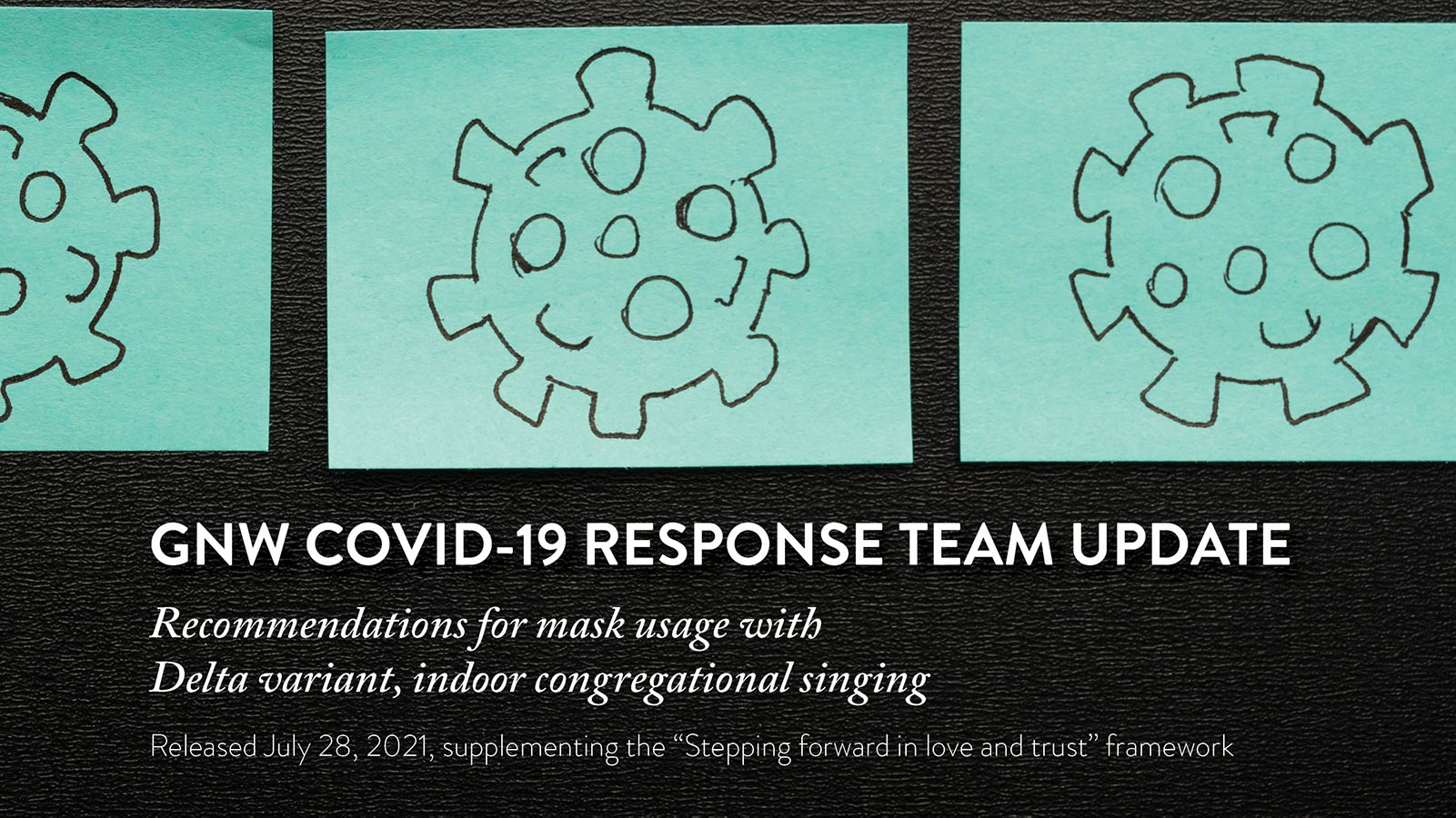
GNW COVID-19 Response Team Update – July 28, 2021
Today, the GNW COVID-19 Response Team is releasing two recommendations based on our ongoing conversations and broader developments in the fight against this disease. Both are directed primarily to churches and ministries in Option 2, though Option 1 ministries should note the words of caution regarding the Delta variant. The first is a recommendation to return to masking indoors in all public settings like worship due to the rampant spread of Delta. The second is our promised guidance on congregational singing.
When we released the last major COVID-19 update – “Stepping forward safely in love and trust” – in May to the Greater Northwest Area, significant latitude was offered to local churches and ministries choosing Option 2. Accepting the responsibility to return to in-person ministry in contextually innovative ways, these ministries have been free to work beyond the cautious GNW recommendations offered in Option 1 with three major expectations and one remaining restriction.
The first major expectation was that local churches and ministries would work carefully within both the guidelines offered by the CDC and parameters set by local and state governments, following whichever was more cautious wherever they might differ. The second major expectation Option 2 churches committed to was watching these standards for changes and regularly monitoring local risk using CovidActNow and information from local and state resources. And the final major expectation was that churches would carefully assess this information, making changes to their practices, especially when risk levels might increase.
In short, “Stepping forward…” allows Option 2 churches the freedom to adapt safely to new possibilities as states reopened this summer, and the responsibility to do so carefully, and possibly to step back as new developments like the Delta variant[i] threaten our progress against this disease.
The one major restriction left in place when “Stepping forward…” was released was a prohibition against indoor congregational singing. At the time, our GNW COVID-19 Response Team engaged in several conversations on the topic, reviewing as we did emerging science often funded by groups committed to these performance arts (read: people who love and dedicate their lives to performing and teaching music). Subsequently, we hosted a webinar to help leaders better understand the unique risks posed by singing.
The following resources are being offered today primarily to churches and ministries in Option 2, though Option 1 ministries should note the words of caution regarding the Delta variant.
- Delta Masking Recommendation
- Indoor Congregational Singing Recommendation
- COVID-19 Statistics Dashboard for Singing
While we are not updating Option 1 at this time, we are continuing to monitor and discuss the impact of this variant and other changes in public policy. We will make changes as the situation warrants.
In ministry with you,
The GNW COVID-19 Response Team
[i] According to OPB & NPR, the Delta variant “appears to be about 225% more transmissible than the original SARS-CoV-2 strains” with – on average – “about 1,000 times more copies of the virus in their respiratory tracts than those infected.” Prior to their update this week, a growing number of epidemiologists were questioning the CDC masking guidance for vaccinated persons in light of Delta, especially for those who are elderly, or those with compromised immune systems or health conditions putting them at risk.
From the Bishop: Join me in honoring Juneteenth National Independence Day
People of God,
“If you continue in my word, you are truly my disciples; and you will know the truth, and the truth will make you free.” John 8: 31-32
June 19, known as Juneteenth, celebrates the freedom of enslaved Black Americans, by recalling the day in 1865 when the news of President Abraham Lincoln’s Emancipation Proclamation was finally proclaimed in Texas, three years after it was issued.
Yesterday the U.S. Congress established June 19th as a federal holiday: Juneteenth National Independence Day. The action awaits President Biden’s signature.
On Saturday, June 19th at 10 a.m., the Coos Bay Museum in Coos Bay, Oregon, will dedicate a memorial to the only confirmed lynching of a Black man in the state of Oregon. Alonzo Tucker was lynched in Coos Bay in 1902 as a crowd of 300 people watched. Sponsors of Saturday’s memorial event hope at least 300 people will attend the online dedication of a memorial to Alonzo Tucker.
The memorial to Alonzo Tucker’s lynching is part of a movement of the National Memorial of Peace and Justice to remember and mark the sites where more than 4,400 Black people died by lynching between 1877 and 1950. Taylor Stewart began the Oregon Remembrance Project after visiting the National Memorial as part of a Civil Rights tour of southern states.
Much of our nation’s violent racial history has been forgotten or suppressed by white Americans or assumed to have occurred only in slave states. This event, on Juneteenth, 2021, is an opportunity for citizens of the Northwest to remember and realize that this region has its own violent past that is ours to reckon with and heal.
I hope you will join me online on Saturday, Juneteenth, 2021, as part of the crowd that stands for truth, justice and reconciliation.
Thank you,

Elaine JW Stanovsky
Bishop, Greater NW Episcopal Area
An update on my retirement plans
Greater Northwest Area clergy and lay members of Alaska, Oregon-Idaho and Pacific Northwest Conferences,
Let us run with perseverance the race that is set before us,
looking to Jesus, the pioneer and perfector of our faith…
After deep reflection, conversation with my family and consultation with trusted colleagues, I am withdrawing my request for retirement, effective January 2022, to continue my assignment to the Greater Northwest Area. I hope and pray that postponing retirement will relieve anxiety and contribute to an orderly transition of leadership for all the conferences in the Western Jurisdiction during this extended pandemic interruption of normalcy. I am not naming a new retirement date at this time but hope that it might follow in-person general and jurisdictional conferences in 2022, with the election and assignments of new bishops, for a new quadrennium, beginning January 1, 2023.
I never intended my retirement to add to the uncertainty of this wilderness passage. I originally named January 1, 2022 as my retirement date so that my retirement would coincide with that of Bishop Hoshibata and possibly, Bishop Hagiya. At the time, we anticipated regular in-person general and jurisdictional conferences in the fall of 2021, when new bishops might be elected to begin serving as the new quadrennium began with the new year.
Since that request, general and jurisdictional conferences have been put off again, further postponing the election and assignment of new bishops. In light of these delays, the timing of my requested retirement is no longer helpful.
I have a renewed sense of focused mission for this extension of my active service and look forward to continuing to work with lay and clergy leadership of the Alaska, Oregon-Idaho and Pacific Northwest Conferences.
Jesus is nudging and tugging the church to engage people and communities with the faith, hope and love of Jesus Christ in ways that bind up wounds, transform lives and overturn systems of exclusion and inequity. We can’t stop now.
I’m still running the race with Jesus. Won’t you pull up your socks, tie your shoelaces, strengthen your weak knees, and join me for the next leg of the race?

Bishop Elaine JW Stanovsky
GNW Area creates Circle of Indigenous Ministries
As friendships and ministries with Native American and Indigenous peoples grow, the Greater Northwest Episcopal Area of The United Methodist Church is creating the Circle of Indigenous Ministries. Developing mutual, healing, and life-affirming relationships with Native Americans and Indigenous peoples in and outside the church is part of the GNW Area’s ongoing efforts to heal historic trauma and dismantle racism.
Rev. Dr. Allen Buck, pastor of Great Spirit United Methodist Church in Portland and a citizen of the Cherokee Nation, is being appointed as the director of the Circle of Indigenous Ministries, beginning July 1. Rev. Buck will also continue as part-time pastor at Great Spirit.
The Circle will support Native American and Indigenous churches, fellowships, and ministry partners through resourcing, coaching, consultation, and friendship in the Alaska, Oregon-Idaho and Pacific Northwest Conferences.
“The goal is to do what we have been doing, but do it more intentionally,” said Buck.
Since Buck was appointed to Great Spirit UMC in Portland in 2017, he has assisted the Oregon-Idaho Conference, as well as his colleagues in the Pacific Northwest Conference and Alaska Conference, in acts of repentance, land return and healing with Native American communities across the area.
“The Christian Church has done deep and lasting harm to Indigenous peoples and cultures around the world for centuries,” Bishop Elaine JW Stanovsky said. “Rev. Buck is helping us learn our history, repent of our sins and form healing partnerships based on humility and mutual respect. ”
“The Circle of Indigenous Ministries will amplify Indigenous voices and their wisdom while also empowering more authentic leadership of Native American and Indigenous peoples within the church,” said Oregon-Idaho Conference Director of Connectional Ministry Laurie Day, who also serves assistant to Bishop Stanovsky.
For years, the Oregon-Idaho Conference has supported Huckleberry Camp for Native American youth at Camp Magruder in the summers as well as a Nez Perce culture camp at Wallowa Lake Camp in northeastern Oregon. In 2016, the unofficial spiritual home of Native American United Methodists in Oregon-Idaho Conference, Wilshire United Methodist Church in Portland, was on the verge of closing. Former Columbia District Superintendent, Rev. Erin Martin, recruited Buck, a citizen of the Cherokee Nation, to serve Wilshire UMC and help grow its ministry into what is now Great Spirit UMC.
The Greater Northwest Area has moved recently into larger acts of repentance and healing, including returning a portion of Wallowa Lake Camp to The Nez Perce Tribe in 2018. In April, the Conference returned the former Wallowa UMC property to the Nimiipuu as well.
Day said Buck has also helped leadership across the Greater Northwest Area begin acts of land recognition, repentance and building more friendships with local tribes and native organizations.
In addition to its work with the Nez Perce Tribe, Great Spirit UMC took ownership of the Chiloquin United Methodist Church building in southern Oregon, when the congregation was officially closed in 2020. Great Spirit UMC has since turned building use over to The Stronghold, a Native-led organization which partners with the Klamath Tribe to provide culturally responsive peer support services to Native people in transition – be it homelessness due to natural disasters, domestic abuse, drug addiction or more.
Buck said there were no conditions placed upon The Stronghold’s use of the building, because as the church works to decolonize white spaces, it is important to listen to what the Native and Indigenous communities want or need.
“It’s all about relationships,” Buck said. “You can’t do Indigenous ministries without relationships.”
Buck said he is excited to mentor and walk with emerging Native and Indigenous leaders who could serve churches in Native communities. He is eager to partner with the GNW Innovation and Vitality Team to help identify and train culturally responsive leaders in the church.
Day said financial support for The Circle of Indigenous Ministries is coming from across the GNW Area and beyond. This work of recognizing and partnering with Native American, Alaska Native and other populations often marginalized by the church is ongoing.

“All of these opportunities are growing, which is why we’re creating the Circle of Indigenous Ministries and we believe Allen Buck is the right leader to continue developing these strong friendships and healing bonds,” Day said. “The need and ministry have grown so much that we cannot wait any longer.”
Grant funding and conferences support will not be enough to develop and sustain the project long-term, which is why the Greater Northwest Area has established a Circle of Indigenous Ministries fund so that individuals may contribute to this growing ministry in the life of the church.
As the incoming director of the new Circle of Indigenous Ministries, Buck said he could use everyone’s prayers as he embarks on this exciting new journey in ministry.
“Pray for us and help us make sure this becomes the priority it needs to be,” he said.
Stepping forward safely in love and trust
Clergy Siblings in Christ,
Clear the path for long-distance runners so no one will trip and fall,
so no one will step in a hole and sprain an ankle.
Help each other out. And run for it!–Hebrews 12:12, The Message
Friends, we have been running to care, serve and survive COVID-19 for more than 14 months and the end is not yet in sight. You have been our essential workers in ministry for many months as our buildings have been largely closed and activities severely restricted.
We have not crossed the finished line, though we have learned a lot, adapted incredibly, and experienced the presence of God in ways we never expected. From my heart, thank you for your endurance, your courage and fortitude, your vulnerability, your compassion, your faithfulness in the valley of the shadow of death.
Attached is new guidance for churches as they Stepping forward safely in love and trust, that builds upon, but replaces Reimagining Life Together.& It acknowledges the continuing risk of disease, advances in science, and the increasing capacity of our local church leaders to manage the risk in their contexts. New responsibility falls to local leaders to understand and guide their ministry settings wisely and safely with fewer mandated guidelines.
Some of you will welcome the shift of responsibility to local leaders. Others may dread managing intense differences of opinion within your congregation as you make difficult decisions locally. I want to call your attention to two provisions from the document that may help you lead with strength.
1. “…please remember Saint Paul’s admonition that what is “permissible” is not always “beneficial” to the common good. (I Corinthians 10:23). While some churches may act quickly to adopt new, less restrictive practices, it is always OK for a church or ministry to choose to remain more cautious for any reason.”
2. “A local church is not permitted to hold in-person worship without the approval of the pastor. For local churches, decisions about the use of church property for worship or other gatherings belong to the pastor without interference from the Board of Trustees (Book of Discipline, ¶ 2533).”
Your trusted lay leaders and clergy colleagues, district superintendents and directors of connectional ministry are your partners in ministry as you lead one more challenge in the fight against this deadly disease.
And most of all, GOD IS WITH US.
May God bless and keep you all in your circles of care — members, friends, family, neighbors, strangers — so no one will trip and fall!
Elaine JW Stanovsky
Bishop, Greater Northwest Area
The United Methodist Church
A pastoral update on our COVID-19 response
Dear Siblings in Christ,
We are making progress, but we are not quite there yet. It has been over a year since the COVID-19 pandemic disrupted life as we knew it. We continue to persevere, exhausted at times, yet anticipating the day when we can gather, greet each other, share communion and other precious rhythms of life and spiritual practice in person without risking harm to one another. Hopeful also that we now carry with us new learnings and practices, hard lessons of necessity that will continue to connect us in new ways in life and ministry.
The rapid vaccine rollout gives us hope that we can enjoy more freedom to gather as families and faith communities soon. Vaccinations coupled with continuous strict adherence to safety protocols are expected to lower infection rates, hospitalizations and COVID-19 related deaths. Overall, we have seen the number of cases decline since the winter peak in many places, but progress has been stalled by premature re-openings, the easing of restrictions in some places, resistance by some to being vaccinated and observing simple safety practices: washing hands, social distancing, wearing a mask. I hope that each of us is continuing to follow these practices, as well as being vaccinated, consistent with medical advice, as soon as we are eligible.
I was surprised by the deep joy that welled up in me when those shots went in my arm, protecting not only me but also everyone I encounter from the dangers of this virus. I’m grateful to every person who is able and willing to join this movement toward health and safety.
As Dr. Rochelle Walensky, director of the Centers for Disease Control and Prevention (CDC), reminded us in a briefing earlier this year,
“We may be done with the virus, but clearly the virus is not done with us. We cannot get comfortable or give in to a false sense of security that the worst of the pandemic is behind us – not now; not when mass vaccination is so very close.”
Permissible not Necessarily Beneficial
In an article for The Atlantic, Dr. James Hamblin of the Yale School of Public Health points out,
“Our social lives can resume, but only when the whole community is ready. The turning point does not arrive for individuals, one by one, as soon as they’ve been vaccinated; it comes for all of us at once, when a population becomes immune.”
With this understanding, we are advised that the number of coronavirus cases needs to decrease further before we resume regular activities, especially in light of the arrival of new fast-spreading variants of the virus. A premature reopening, even if allowed by the state, may run the risk of not just stalling but even reversing the recent progress we have already achieved.
I am reminded of Saint Paul’s admonition that things that are “permissible” are not necessarily things that are “beneficial” to the common good. (I Corinthians 10:23).
While we should celebrate the good news of vaccines providing a layer of protection already for a significant number of members in some of our congregations, the church does not belong solely to those who are vaccinated. Especially as we have just now reached a time when all adults are eligible to receive a vaccine, we must continue to be patient to allow them the privilege of receiving this gift of security before we consider letting our guard down. At the same time, we will need to find ways to protect and include children in church life while continuing to wait for vaccination eligibility to be extended to them.
As the church, God calls us always to do things that are beneficial because we bear responsibility towards the well-being of others, especially the most vulnerable among us.
A Posture of Hopeful Caution
The progress we see in vaccinations, tempered by the potential threat of variants we race, leads me toward a posture of hopeful caution; we are almost there but not quite there yet. Even as our hope is renewed with the increasing percentage of those vaccinated, our decisions and actions must continue to manifest the utmost concern for one another as an act of love in response to Jesus’ command for us to love one another as he had loved us (John 13:34).
Accordingly, I am asking churches to remain vigilant in their planning and decision-making processes. The COVID-19 Response Team, made up of lay and clergy members from across the area, is continuing to review and amend its guidance to local churches. By May 5th, we will release updated guidelines for Phase 3, shifting more responsibility to local leaders to guide their congregation’s, camp’s or other ministry setting’s COVID-19 response.
I am grateful for each of you and your faithfulness and commitment, especially during this long time of physical separation due to this pandemic. May the hard lessons learned as we have persevered, and new skills developed as you have adapted, empower our work together and witness to God’s love which never fails us.
“Those who wait for the LORD shall renew their strength.” (Isaiah 40:31)
With love and grace,

Elaine JW Stanovsky
Bishop, Greater Northwest Episcopal Area
Offered in consultation with the COVID-19 Response Team, as currently composed:
- Rev. Alyssa Baker, pastor, Open Door Churches of Salem-Keizer, OR-ID Conference
- Laurie Day, OR-ID Conference Director of Connectional Ministries
- Rev. Jim Doepken, pastor, Moose Pass & Seward Memorial UMCs, Alaska Conference
- Rev. Mark Galang, Puget Sound District Superintendent, PNW Conference
- Rhondalei Gabuat, Executive Assistant for Bishop Stanovsky Greater Northwest Episcopal Area
- Rev. Karen Hernandez, Sage District Superintendent, OR-ID Conference
- Rev. Pat Longstroth, pastor, Bremerton UMC, PNW Conference
- Becky Platt, lay member, Boise (ID): Whitney UMC, OR-ID Conference
- Patrick Scriven, PNW Conference Director of Communications
- Jim Truitt, lay member, Renton (WA): Fairwood Community UMC, PNW Conference
